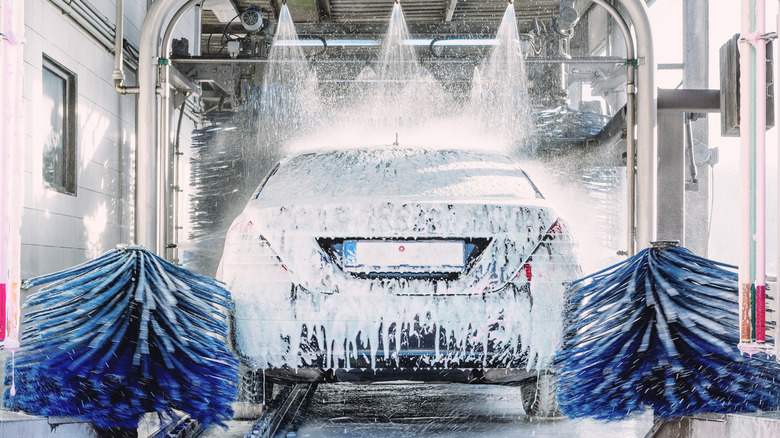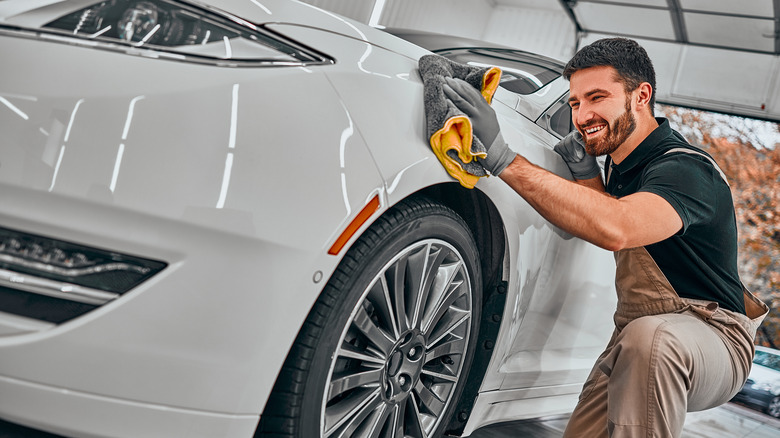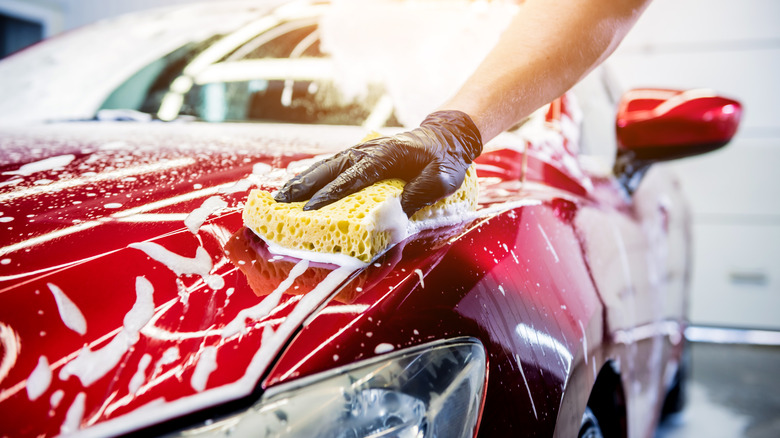Here's What Car Washes Are Really Doing To Your Car
There are times when hand-washing your car seems more like a chore than a fun, scintillating experience, as depicted in movies. Not everyone has a private parking area or garage, and you'll need a handful of cleaning tools, buckets, and access to a strong water connection to get the job done right. It's one of the many reasons why automatic car washes are a godsend for most people, offering a quick service and easy accessibility. The first car wash business in the United States opened in Detroit in 1914. Still, the first automated wash facilities weren't established until 1940 (per Aqua Bio), and washing technology hasn't looked back since.
There will be approximately 59,000 car wash and auto detailing businesses across the continental United States in 2022 (a slight decline of -0.9% to 2021), with California, Texas, and Florida having the most car wash garages (per IBIS World). No wonder people like driving their car to an automatic wash station, paying the dues, and watching the magic unfold with its cacophony of spinning brushes, pressurized snow foam, and rotating washcloths. The car is clean in under five minutes (via Columbia Tire Auto), a miracle if there ever was one.
Will automatic car washes harm my car's paint?
Yes, absolutely. There's a reason why professional detailer and popular "cleanfluencer," according to his many followers, Larry Kosilla of AMMO NYC charges $2,500 for basic cleaning and up to five figures depending on the car's condition (per The New York Times). Cleaning any car is about reducing friction while removing dirt, but automatic car washes do the exact opposite.
According to Car Magazine UK, the convenience of automatic car washes come at the expense of damaging your car's paint. The machines will slap and contact your car's paint while introducing various contaminants that cause scratches and swirl marks, and the damage is more evident if you have a black or dark-colored vehicle. Those awesome-looking, rotating brushes are typically poorly maintained and will cause the cross-contamination of dirt from other cars. Repeated exposure to poorly-maintained wash brushes will eventually dull your car's paint and make it look old or dated.
The worst part? Removing the damage from scratches that may appear means pre-cleaning, polishing, waxing, and sealing the paint, which will cost money. You could also opt for a ceramic coating, but this also requires time and money. Moreover, there are "touchless" car washes that don't use brushes, but the results are somewhat mediocre in comparison. So if you think paying $10 for an automatic car wash is worth it, think again.
How to wash a car
As car lovers, we must admit that hand-washing a car takes time, patience, and the right tools. But for people like us, washing a vehicle is therapeutic -– unless you do it in the winter! But in reality, it only takes an hour or two on a fair-weathered afternoon to keep your pride and joy looking spotless.
Tip 1: Avoid washing a hot car or while under direct sunlight. Not only will the heat and UV exposure damage your skin, but it will also cause water spotting on the paint, which is not good. Park the vehicle under the shade or wash your car in mid-afternoon whenever possible.
Tip 2: Rinse and wash the car from the top to avoid scratching. Start with the hood, roof, and trunk before cleaning the vehicle's fenders, doors, bumpers, and lower parts.
Tip 3: Avoid using dish soap to wash your car. Dish soap will strip off the protective layer of wax in your paint and cause premature aging of rubber, damage to plastic components, and dulling of chrome parts. Try using a mild car shampoo, at the very least.


